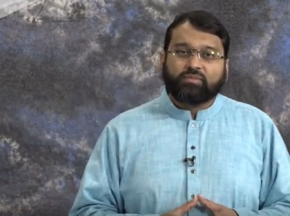content of level
Getting To Know Potential Spouse Without Disobeying Allah
In Islam we are encouraged to meet a potential spouse in the presence of a Mahram and get to know them. Many ahadith encourage looking at and physically meeting a potential spouse.
In My Home Can I Hang Verses Of Quran For Blessing?
Almost all Muslim homes are decorated with Calligraphy of Quranic Verses. The idea behind these decorations is to remind us of the message & meaning of those verses. They don't necessarily bring barakah just because they are hung on the walls of our home.
Applied For A Loan In Dollars & Received In Pounds, How Do I Pay Back?
This issue is happening with brexit and around the world when you take a loan in dollars but they pay you in pounds. When it comes to money exchange it is given hand to hand immediately, and it has to be exact same quantity and in same currency it was received in.
How Do I Repent From Gossiping?
One of the worst traits a person can have is to speak ill behind someone's back when they cannot defend themselves. It is important we realize and accept that at some point even those with good character have gossiped and have been sinful.
Can I Combine Intention For Nafil, Sunnah & Intermittent Fast?
When you want to do something for the sake of Allah, it should truly be for the sake of Allah. You have to struggle and strive to please Allah primarily. Everything else needs to be a secondary intention. Your prime focus should be pleasure of Allah by performance of a good deed. Your focus cannot be weight-loss primarily. When you are fasting for the sake of Allah, what you do during the fast matters. You are not just starving yourself from food. You have to change your attitude. Shaykh Abu Eesa answers and explains..
Is Ghusl Needed If My Period Began Right After Intercourse?
After marital relations you are in a state of ritual impurity (called Janaba where recitation of Qur'an is not allowed) which is different from the state of menstruation. During menstruation even though there is a difference of opinion you are allowed to recite Quran without touching it physically. Some ulema even encourage it.
Is The Reward More For Washing Feet Or Wiping Over Socks During Wudu
A vast majority of scholars prefer washing feet during Wudu. It is the asal and the basic principle. But let's also remember it is sunnah to wipe over socks.
Is There Such Thing As Good Bid’ah and Bad Bid’ah?
Bid’ah has always been known by most to be something negative. Anything the Prophet (ﷺ) did not do or Allah (SWT) has not instructed us to do, we must not do any of it. However, scholars have discussed in regards to differentiating between a ‘good Bid’ah’ and a ‘bad Bid’ah.'
Do We Have Free Will Or Is Everything Predestined?
If Allah has predestined everything, then what is the point of doing anything? Do we even have free will if everything we do is already written and known by Allah?
I Want To Begin Praying But Haven't In Years, What Do I Do?
Prayer is the second pillar of Islam. Without a doubt, it is a crucial aspect of our deen. If a person has not prayed in years, but wants to start doing so, how should they go about that? What should they do?
How Should Two People Praying Together Stand In Salah?
When two people are in jam’ah together, where should the imam be standing and where should the follower stand? A common practice is for the follower to be a little behind the imam. Is this correct?
8 Or 20 For Taraweeh?
We all agree that Taraweeh – the additional prayers after Isha during the month of Ramadan – is optional. Can we then, as a community, justify creating trouble for each other if some pray more Taraweeh, or less?
Can I Pray Taraweeh Behind A Child?
A lot of mosques allow students of the Qur'an as young as 10 years old lead Taraweeh prayer in Ramadan. But is this actually allowed? What are the conditions for one to lead salah?
How Should I Be Spending My Last 10 Days Of Ramadan?
We all want to make the most of the last 10 days and nights of Ramadan. After all, it is during these nights when Laylatul Qadr takes place. Are there any specific acts of worship we should be doing during the last 10 days of Ramadan?
What If I'm Unable To Fast The Entire Month Of Ramadan?
If I get bad headaches and sickness due to fasting in Ramadan and cannot fast the whole month. What then? Do I make up the fasts later on or am I exempt from fasting?
What Is Laylatul Qadr?
We all know that during the last 10 days of Ramadan, masjids fill up and people are more active, all in the hopes they might witness Laylatul Qadr. But what is Laylatul Qadr? What does it mean and why is it so significant?
When Is Laylatul Qadr?
Everyone has a different idea as to what night Laylatul Qadr is on. Some say it's the 27th, others say differently... But how do we know when it is exactly? Will it forever remain a mystery?
Can I Still Eat Suhoor While The Fajr Adhan Is Called?
I haven't finished my meal or glass of water but the adhan for fajr has been called. Is my fast broken if I continue to eat or drink while the adhan is going on?
When Do I Make Up Fasts & Pay Fidyah Or Kaffarah?
Due to sickness or other reasons, we might have missed some days of fasting in Ramadan. When is the best time to make up those fasts, and when do we have to pay fidyah or kaffrah, the amounts paid in place of making up fasts?
How Do I Give Zakat On My Wealth?
Muslims are required to pay zakat on their wealth, but what are the rulings on doing so? How do we give zakat on our wealth?



















